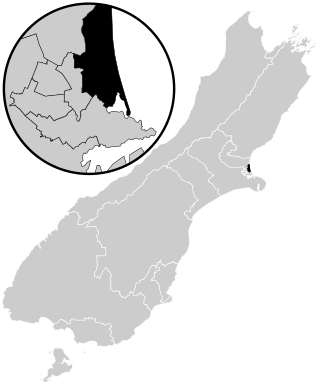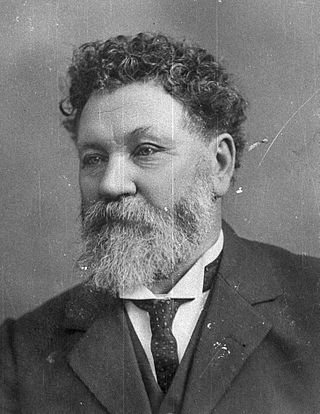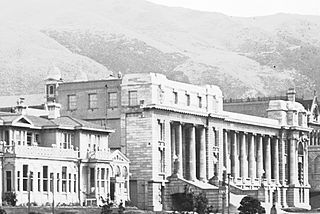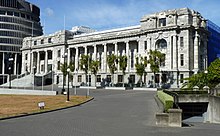
The 1931 New Zealand general election was a nationwide vote to determine the shape of the New Zealand Parliament's 24th term. It resulted in the newly formed coalition between the United Party and the Reform Party remaining in office as the United–Reform Coalition Government, although the opposition Labour Party made some minor gains despite tallying more votes than any other single party.

The 25th New Zealand Parliament was a term of the New Zealand Parliament. It opened on 25 March 1936, following the 1935 election. It was dissolved on 16 September 1938 in preparation for the 1938 election.

Christchurch East, originally called Christchurch City East, is a current New Zealand parliamentary electorate. It was first created for the 1871 election and was abolished for two periods, from 1875–1905 and again from 1946–1996. It was last created for the introduction of the MMP voting system for the 1996 election. The current MP is Reuben Davidson, a member of the New Zealand Labour Party who was first elected in the 2023 New Zealand general election.

Dunedin North is a former New Zealand parliamentary electorate, which returned one Member of Parliament (MP) to the New Zealand House of Representatives. It was established for the 1905 election and has existed since. It was last held by David Clark of the New Zealand Labour Party, who replaced the long-standing representative Pete Hodgson. It was considered a safe Labour seat, with Labour holding the seat for all but one term (1975–1978) since 1928. In the 2020 electoral boundary review, Otago Peninsula was added to the area to address a population quota shortfall; with this change the electorate was succeeded by the Dunedin electorate in the 2020 election.

Waikato is an electorate in the New Zealand Parliament. A Waikato electorate was first created in 1871 and an electorate by this name has existed from 1871 to 1963, 1969 to 1996, and 2008 to the present, though exact borders have often changed.

Eden, a former New Zealand parliamentary electorate, lay in the general area of the suburb of Mount Eden in the city of Auckland.
Manukau is a former New Zealand parliamentary electorate in the south Auckland Region. It existed from 1881 to 1978, with a break from 1938 to 1954. It was represented by nine Members of Parliament. Two by-elections were held in the electorate.
Grey Lynn is a former New Zealand parliamentary electorate, in the city of Auckland. It existed from 1902 to 1978, and was represented by nine Members of Parliament.

John McLachlan was a New Zealand Member of Parliament for Ashburton in the South Island.
Motueka is a former New Zealand parliamentary electorate. It was first created in 1860 and existed until the 1890 election, when it was abolished. For the 1896 election the Motueka electorate was recreated, and lasted until the 1946 election, when it was again abolished.
The United–Reform Coalition, also known as the National Political Federation from 1935, was a coalition between two of the three major parties of New Zealand, the United and Reform parties, from 1931 to 1936. The Coalition formed the United–Reform coalition Government of New Zealand from its formation in September 1931, successfully contesting and winning the 1931 general election in December. The Coalition was defeated at the 1935 general election by Labour. The following year the coalition was formalised by the formation of the modern New Zealand National Party.

The 22nd New Zealand Parliament was a term of the New Zealand Parliament. Its composition was determined by the 1925 election, and it sat until the 1928 election.
Kaiapoi was a rural New Zealand electorate, north of Christchurch in the Canterbury region of New Zealand from 1861 to 1946. It was represented by twelve Members of Parliament.

Alexander Donald McLeod was a Reform Party Member of Parliament in the Wairarapa region of New Zealand. He was Minister of Lands (1924–1928) and Industries and Commerce (1926–1928) in the Reform Government.
Marsden was a former parliamentary electorate, in the Whangarei District and in the Northland Region of New Zealand, which existed from 1858 to 1972. Upon its abolition, Marsden was replaced with the Whangarei electorate.

Harry Reginald Jenkins was a New Zealand Member of Parliament for Parnell in Auckland, New Zealand, representing the United Party.

The 20th New Zealand Parliament was a term of the New Zealand Parliament. It was elected at the 1919 general election in December of that year.

The 21st New Zealand Parliament was a term of the New Zealand Parliament. It was elected at the 1922 general election in December of that year.

The 23rd New Zealand Parliament was a term of the New Zealand Parliament. It was elected at the 1928 general election in November of that year.

The 1936 Manukau by-election was a by-election during the 25th New Zealand Parliament in the Manukau electorate. It was held on Wednesday 30 September 1936. This by-election came about because of the resignation of Bill Jordan upon his appointment to the position of High Commissioner to the UK during the term of the 25th New Zealand Parliament. The by-election in the Manukau electorate was contested by Arthur Osborne for Labour and Frederick Doidge for National, with Osborne winning the election.













